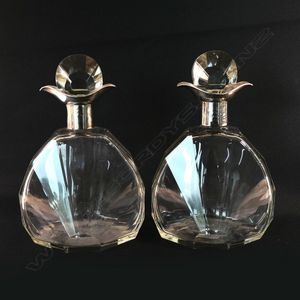Art Deco Crystal Decanters with Silver Collars and Double Spouts
A pair of Art Deco crystal decanters, sunray facetted flask bodies with silver collars and double spouts, with conforming stoppers. Birmingham 1924 by Wilmot Manufacturing Co, height 23 cm
You must be a subscriber, and be logged in to view price and dealer details.
Subscribe Now to view actual auction price for this item
When you subscribe, you have the option of setting the currency in which to display prices to $Au, $US, $NZ or Stg.
This item has been sold, and the description, image and price are for reference purposes only.
- Faceting - Faceting is a technique of removing material from a curved surface, to give a series of flat surfaces but retaining the profile of the original surface.
The technique is most commonly associated with diamond cutting where the various cuts used such as rose cut and brilliant cut, add life and sparkle to the stone, whilst at the same time removing as little of the stone as possible.
Faceting by grinding is also used to decorate glass. The stems of many drinking glasses are decorated by cutting a series of flat surfaces on a circular stem, and hollow vessels such as vases may have faceted surfaces.
In furniture faceting is often applied to legs of tables and chairs, where a circular baluster shaped section is flattened so as to form an octagonal section. - Art Deco Period - The Art Deco period was a cultural movement that emerged in the 1920s and 1930s, and was characterized by its emphasis on modernism, luxury, and elegance. The name "Art Deco" comes from the Exposition Internationale des Arts Décoratifs et Industriels Modernes, a large exhibition held in Paris in 1925 that showcased the latest trends in decorative arts.
Art Deco was a reaction against the ornate and elaborate styles of the previous era, and reflected a new modern sensibility. It was characterized by streamlined, geometric shapes, bright colours, and the use of new materials such as chrome, glass, and Bakelite. Art Deco designers sought to create a sense of luxury and sophistication, often incorporating expensive materials such as ivory, marble, and rare woods.
Art Deco had a significant impact on a wide range of artistic fields, including architecture, fashion, graphic design, and interior design. Some of the most iconic examples of Art Deco architecture include the Empire State Building in New York City, the Hoover Building in London, and the Palais de Chaillot in Paris.
The Art Deco period came to an end in the 1940s, as World War II and changing cultural trends led to a shift in artistic styles. However, Art Deco remains an important influence on design and art, and continues to be celebrated for its modernist sensibility and glamorous aesthetic.
This item has been included into following indexes:
-
decanters, period or style
- Art Deco 16
- silver mounted 158
